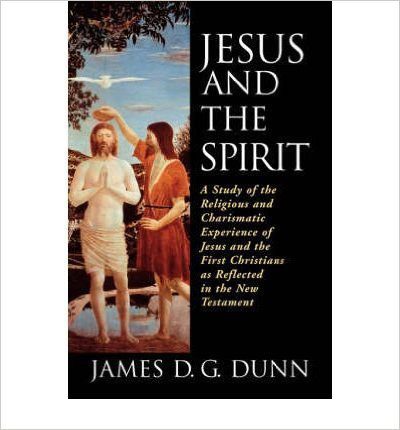 I recently read James D.G. Dunn’s book entitled Jesus and the Spirit: A Study of the Religious and Charismatic Experience of Jesus and the First Christians as Reflected in the New Testament, published in 1975. It was his second book. Jimmy, as his friends call him, went on to become one of the premier New Testament (NT) scholars in the world and perhaps the foremost scholar on Christology, largely due to his book published in 1980 entitled Christology in the Making (short title), published in 1980 and now in its third edition.
I recently read James D.G. Dunn’s book entitled Jesus and the Spirit: A Study of the Religious and Charismatic Experience of Jesus and the First Christians as Reflected in the New Testament, published in 1975. It was his second book. Jimmy, as his friends call him, went on to become one of the premier New Testament (NT) scholars in the world and perhaps the foremost scholar on Christology, largely due to his book published in 1980 entitled Christology in the Making (short title), published in 1980 and now in its third edition.
I read this book mostly because of my interest in Jesus’ self-consciousness regarding his identity and his experience of the Spirit. So, that is what I will focus on in this review, that is, the first four chapters, so that it is not complete review of the book.
 Dunn begins this book with an Introduction (p. 1) by quoting a scholar who writes, “The core of religion is religious experience.” I think this is quite true. I first experienced God and Jesus when I was “born again” at age thirteen by receiving Jesus into my life in a prayer with my Sunday school teacher. When I went to college, I began my theological education by attending a Bible church that was sort of a mini-seminary. I learned a lot about the Bible and Christian theology in the next twelve years there, but the pastor de-emphasized personal experience by substituting what he called “Bible doctrine.” And he, like many American Evangelicals, denied that Christian faith is a “religion,” a word he redefined as man doing good works to attain God’s approval. I eventually came to prefer to use words as the dictionary defines them. Accordingly, religious experience is a wide-ranging concept.
Dunn begins this book with an Introduction (p. 1) by quoting a scholar who writes, “The core of religion is religious experience.” I think this is quite true. I first experienced God and Jesus when I was “born again” at age thirteen by receiving Jesus into my life in a prayer with my Sunday school teacher. When I went to college, I began my theological education by attending a Bible church that was sort of a mini-seminary. I learned a lot about the Bible and Christian theology in the next twelve years there, but the pastor de-emphasized personal experience by substituting what he called “Bible doctrine.” And he, like many American Evangelicals, denied that Christian faith is a “religion,” a word he redefined as man doing good works to attain God’s approval. I eventually came to prefer to use words as the dictionary defines them. Accordingly, religious experience is a wide-ranging concept.
Jimmy also says in this Introduction (p. 6), “this volume serves as something of a sequel to my earlier study, Baptism in the Holy Spirit” (short title), published in 1970. In that first book, he lays out Spirit baptism in the NT. In this second book, he focuses on Jesus’ experience of the Spirit, and that of the early Christians, as in the NT. So, in the review I will consider only what Dunn says of Jesus’ experience.
Dunn asks (p. 11, italics always his), “What was Jesus’ experience of God?” He adds, “I am not asking, What was Jesus’ concept of God, his teaching about God.” Dunn says, “traditional, classic Christianity strongly affirms the deity of Jesus—that Jesus of Nazareth was God become man…. traditional Christianity has recognized, however inadequately, that whatever else he is, Jesus is (a?) man before God…. who prays to God.”
Dunn says (pp. 12-13) among NT scholars in the nineteenth century “it has become almost commonplace to deny writing a biographical study of Jesus or of saying anything about his self-consciousness or ‘inner life.’” He says these two concepts should be separated and that something of the latter can be determined. Dunn adds, “it is my contention that we are in a position to see fairly deeply into Jesus’ experience of God at certain points [in the NT], and so may begin to understand how he conceived of his relation with God,” thus (p. 13), “Jesus faith in God.”
Dunn doesn’t say, but the question arises, “How can Jesus have faith in God if he is God?” Thomas Aquinas (Summa Theologica, 3.7.3), whom the Roman Catholic Church regards as the greatest post-apostolic theologian of all, taught the beatific vision and so answered, “From the first moment of his conception Christ had the full vision of God in his essence … Therefore he could not have had faith.” This was his logical conclusion due to his traditional belief that Jesus was God.
Dunn begins this examination of Jesus’ experience of God by saying (p. 16), “Jesus regarded prayer as of first importance.” Jimmy then says of the NT gospels (p. 38), “the evidence permits us to speak only of Jesus’ consciousness of an intimate relationship with God, not of awareness of metaphysical sonship, nor of a ‘divine consciousness’, (far less conscious of being ‘Second Person of the Trinity’!). Even to speak of a consciousness of ‘divine sonship’ is misleading. And certainly to speak of an awareness of preexistence goes far beyond the evidence.”
How did Jesus conceive of the Spirit of God? Dunn informs (p. 47), “’Spirit of God’ in Judaism denoted the power of God.” Indeed, Judaism has always differed with Christianity in claiming that the Holy Spirit is not a person, and that is why Jewish scholars do not capitalize “spirit” when referring to God whereas Christians do.
Jimmy explains (p. 62), “quite basic to Jesus’ experience of God,… was his sense of sonship and his consciousness of Spirit.” Jesus had this unshakable sense of having divine authority due to his exorcisms and healings (pp. 69-82. Yet Dunn says, (p. 91) “The fact is that we cannot analyse the content of Jesus’ self-consciousness in any detail. We cannot answer with any precision the question, Who did Jesus think he was?… All we can say is that he lived out of a consciousness of sonship and power.” Dunn asserts (p. 15), “it is highly questionable whether Jesus thought of himself in terms of titles at all.”
I disagree with this. Jesus certainly knew God sent him to be the Messiah of Israel. Yes, he did invoke what scholars came to call “the Messianic secret;” but this reserve in so identifying himself publicly was to avoid being put to death before his time. For, he once asked his disciples, “Who do you say that I am?” (Matt. 16.15; Mark 8.29; Luke 9.20). Matthew writes, “”Simon Peter answered, ‘You are the Messiah, the Son of the living God’” (Matt. 16.16 nrsv). Only Matthew adds, “And Jesus answered, ‘Blessed are you, Simon’” (v. 17), and then Jesus expounds about his church and promises to give Peter the keys of the kingdom (vv. 18-19). This response reveals that Jesus approved of Peter’s identification of him as Israel’s Messiah. But some scholars don’t think Matt. 16.18-19 is historically authentic largely due to the lack of multiple attestation (=not in any other gospel).
Besides, Jesus finally admitted it publicly, though obliquely, at his hearing before the Sanhedrin. The high priest Caiaphas demanded of him, “‘tell us if you are the Messiah, the Son of God.’ Jesus said to him, ‘You have said so. But I tell you, From now on you will see the Son of Man seated at the right hand of Power and coming on the clouds of heaven’” (Matt. 26.63-64 niv). Jesus here clearly identified himself as “one like a son of man” in Daniel 7.13. According to the NT gospels, “Son of Man” was Jesus’ favorite title of self-identification. According to my book The Gospels Interwoven, he said it 37 or 38 times in his gospel sayings. Daniel 7.14 reveals that this title portrays a greater authority, since it is worldwide, than that of Israel’s Messiah.
Dunn writes about the historical Jesus concept as set forth by historical-critical scholars when he states (p. 92), “if we can indeed properly speak of the ‘divinity’ of the historical Jesus, we can only do so in terms of his experience of God; his ‘divinity’ means his relationship with the Father as son and the Spirit of God in him.”
In his other books, Dunn makes it clear he believes in “developmental Christology.” His PhD instructor C.F.D. Moule pub forth that hypothesis most notably in The Origin of Christology (1977). So, Dunn doesn’t think Jesus believed he was God; yet Dunn accepts the later development that the church correctly decided that Jesus was God. Nevertheless, Jimmy sometimes disparages the doctrine of the Trinity. And he does not think the earliest Jewish Christians worshipped Jesus as God. (See my post on September 13, 2013, which is a review of his book, Did the First Christians Worship Jesus? The New Testament Evidence [2010]).












